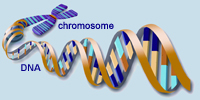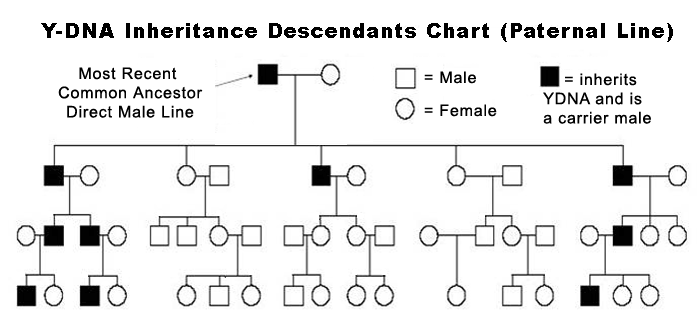 Genetic research is widely used to identify and analyze practically all living and once living things. It is probably best known as a forensic tool used to positively connect certain evidence from a crime scene to a particular person. Genetics is also used in a wide variety of other ways, especially as it's medical implications are better understood. It is also being used with great success and importance in ancestral research and with genealogy.
Genetic research is widely used to identify and analyze practically all living and once living things. It is probably best known as a forensic tool used to positively connect certain evidence from a crime scene to a particular person. Genetics is also used in a wide variety of other ways, especially as it's medical implications are better understood. It is also being used with great success and importance in ancestral research and with genealogy.
Genetics when used with genealogy, is not the stuff of eye color, physical features or medical information. Genealogical DNA testing is focused exclusively on information that can show ethnic make up, ancestral homelands and migrations, prove individual connections to other individuals, thereby establishing family groupings and ancestral lineages. It is a serious and complicated science, which can be used in various depths and complexity and is completely trusted by the genealogist and scientific community alike. Genetics can be extremely important to personal and family genealogy because it can scientifically discover and prove connections we otherwise might know only from a collection of documents, references and memorabilia, which in some cases might otherwise be considered questionable or incomplete.
Genetics with genealogy is accomplished by testing DNA from living people and comparing those results with results from other living or sometimes deceased people similarly tested. It is from these comparisons that analysis is done and conclusions made. These "DNA tests" are now quite common, reasonably affordable and accessible to almost anyone who is willing to participate.
Early genetic testing had an immediate impact on all Jam?sons, everywhere. It quickly proved that there are several genetically different people and families, in regards to each of our different ancestral pedigree lineages, amongst those of us who use the same Jam?son surname. Furthermore, that there are not just one or two genetically different Jam?son strains, but many, some even from the same geographical places. Most importantly to our particular Jameson family, is that having now tested several members of our known family and discovering others by way of unsolicited tests (see following DNA pages, listed below), we can now say with a high degree of confidence, that we know what DNA defines our Jam?son pedigree and our indisputable and unique Y-DNA profile, from which all other men in this entire universe can be tested for a match, or mismatch. This also gives us a basic understanding of our anthropological history.
Several other examples of just how effective genetics testing can be with genealogy research can be found within our own Jameson family. As an example, we have solved several questions including that Thomas and Hugh Jameson were brothers, as had long been thought, but could never likely be otherwise proven. We can now also say that the William Jameson, living contemporaneously in Windham, New Hampshire, was not a brother, nor was he related in any way to our family, contrary to what had been thought for some time. More importantly however, is that we have found new Jam?son family groups that test as direct relatives, that we would never have been able to otherwise do. The biggest goal is of course, to be able to extend what we know about any of our ancestors, beyond what more traditional methods can allow.
We can also now able to better understand the many other various Jam?son family clusters which formed and how these and ours are completely different or somewhat alike. As an example the Y-DNA results from our Jameson family and the Y-DNA results from the Irish Whiskey Jameson family are similar enough to suggest there was probably some common ancestor between our two families and that was likely to be somewhere in Scotland and might have been as recent as somewhere between the twelfth century, when surnames were first used and the 16th century, where after the Whiskey Jamesons are otherwise accounted for without any apparent connection with our family.
Genetic testing will continue to improve over time with better and wider testing. Because DNA with genealogy is a comparative process and can only be as as good as the number of people tested, the more people tested the greater possibilities are for matches and therefore analysis and conclusions. It is important therefore, that everyone possible tests, even if you feel it is not something you feel you can understand. Like everything else genealogical DNA usage requires a little effort to grasp and use. However difficult that may first appear, it is not really that complicated. We urge you to get involved.
SOME SPECIFICS about DNA Testing

 There are currently three basic DNA tests available with respect to genetics and genealogy, autosomal (atDNA), which tests for all ancestry; mitochondrial DNA (mtDNA), which tests a man or woman along their direct maternal line; and Y-Chromosome (Y-DNA), which tests a male along his direct paternal line.
There are currently three basic DNA tests available with respect to genetics and genealogy, autosomal (atDNA), which tests for all ancestry; mitochondrial DNA (mtDNA), which tests a man or woman along their direct maternal line; and Y-Chromosome (Y-DNA), which tests a male along his direct paternal line.
Any of these tests can be used to some degree for recent genealogy or for ethnic ancestry. For our purposes - determining the history, ancestry and complete content of our particular Jameson family - Y-DNA testing is the best use of genetics. The Y-DNA chromosome can only be found in living male descendants and parts of tested for genetic genealogy are basically identical going back thousands of years. Any male Jameson with a Y-DNA profile that matches what we have determined to be "our family," regardless of where he is or how his linage unfolds, can reliably say he is part of our unique Jameson family. Sometimes atDNA testing can help with this as well, particularly with respect as to indicating connections that Y-DNA "male only" testing cannot do. Unfortunately the ambigutiy of atDNA testing is not usually reliable enough to be considered proof in a way that Y-DNA can.
HOW Y-DNA TESTING WORKS
Genetic Scientists have discovered and developed two different ways to test the Y-Chromosome that can specifically help with genealogy. These two types of tests, involve different parts of the Y-Chromosome, for different reasons, with results that are in some ways overlapping. These different tests do not conflict with each other - they actually confirm each other, although in somewhat different ways.
One method tests a certain part of the Y-Chromosome known as the SNP markers, a slow mutating group, where the results are collectively known as that persons "Haplogroup." This Haplo part of DNA reveals when a mutation occured, generally definimg that person's anttropoligical periods (blocks) in time, when branches within the overall Haplo tree span, began.
The other type of test looks at the STR markers, a different and somewhat more active collection of specific ambiguous markers, collectively chosen for their reliability and because they occur in everybody's Y-DNA, are labeled as the "DYS" profile, which can be thought of as a genealogical fingerprint. The "DYS" part of the Y-DNA test is expressed as a series of numbers that when taken as a whole, represent a DNA profile, much like a fingerprint. It is this last category (DYS profile) that is most often considered useful to relationship genealogy.
Y-DNA testing is, for the most part, a comparative process, comparing one persons test directly with someone else's 'test', looking for a match.
 - Click here for our Jameson Y-DNA STR (Haplogroup) details and results.
- Click here for our Jameson Y-DNA STR (Haplogroup) details and results.
 - Click here for our Jameson genetic DYS marker test results and Y-DNA Profile.
- Click here for our Jameson genetic DYS marker test results and Y-DNA Profile.

 In the last few years DNA testing for use with researching family histories and genealogy, has become widely available, affordable and as such a unique and important toot. There are now several very reputable labs who do this specifically for genealogy as well as groups who have organized for unique family projects.
In the last few years DNA testing for use with researching family histories and genealogy, has become widely available, affordable and as such a unique and important toot. There are now several very reputable labs who do this specifically for genealogy as well as groups who have organized for unique family projects.
We test for the Y Chromosome and use the Family Tree DNA - Genealogy by Genetics, Ltd. company. This type of DNA testing helps us understand and focus on the patriarchal nature and family grouping of our specific Jameson family. We are part of several DNA Projects including: The Jameson Family DNA Project, the Gunn Sept List DNA Project, the Clan Stewart DNA Project, the Ulster (Ireland) Heritage DNA Project, the Scotland DNA Project, and the Haplogroup I1 Project.
We urge every Jameson male descendant (must have the Jameson surname) to help find your own ancestors with this DNA program. Please read this page of answers about DNA testing and then contact us about how to coordinate your results.
 - for information on how to get started.
- for information on how to get started.